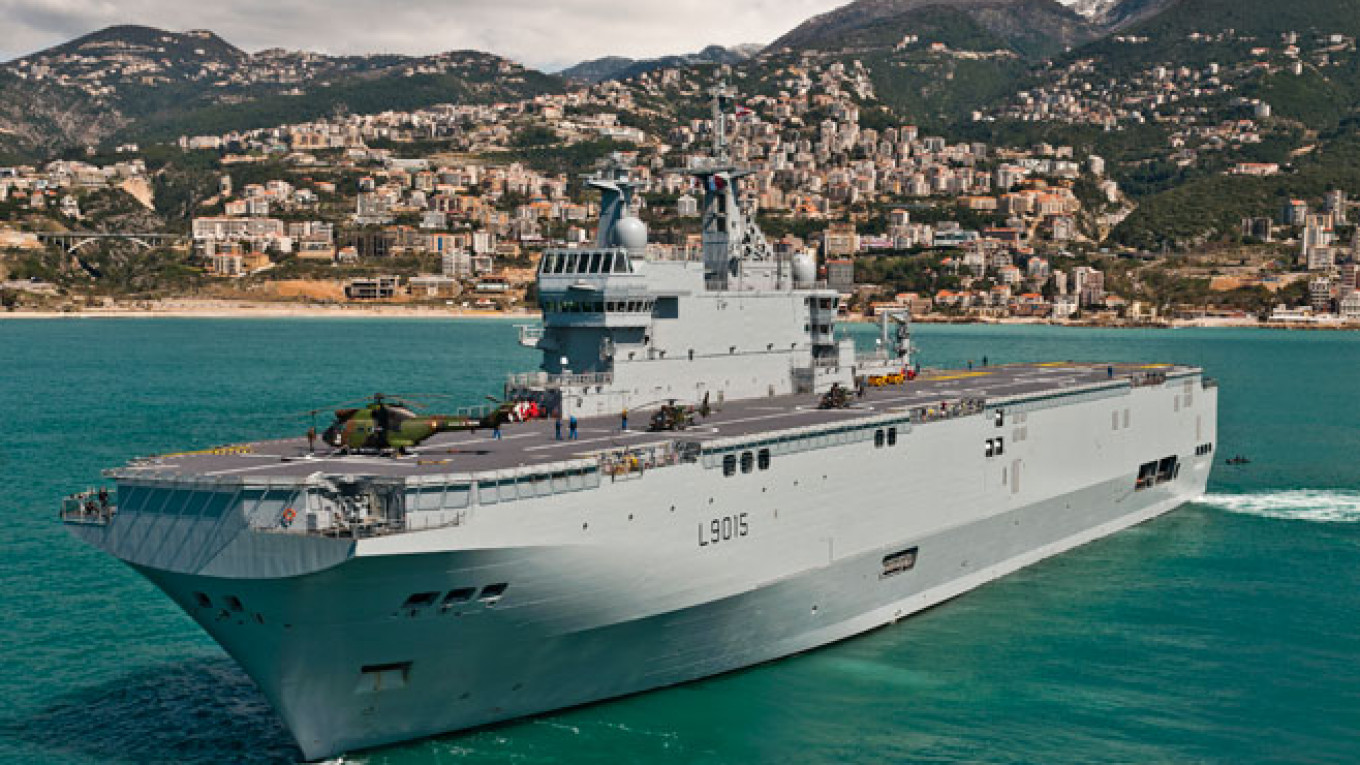The annexation of Crimea and Russian support for the separatists engaged in an ongoing bloody conflict in eastern Ukraine undoubtedly have the potential to make Russia an international pariah. But until now the reaction in the West has been limited to derogatory media coverage, minor sanctions and restrictions on travel for some Russian officials, while politicians both in Europe and the U.S. seem unwilling to punish Russia with further, harsher sanctions that may affect the interests and economies of their own states.
One of the most obvious examples of this is France's unwillingness to drop the ill-fated and controversial contract to supply two Mistral-class amphibious assault ships to the Russian navy. The deal was struck with the Russian Defense Ministry in 2011 and is valued at about $1.5 billion.
Russia has already paid France most of the cost of both ships, the first of which is due to be delivered this month, and Russia has threatened "significant" penalties if the French postpone the delivery.
Despite calls by British Prime Minister David Cameron, German Chancellor Angela Merkel, U.S. President Barack Obama and other international leaders for the French to abandon the sale of the Mistrals, French President Francois Hollande has repeatedly assured Russia that the contract will be executed and the Mistrals will be delivered.
Many analysts have come up with all sorts of suggestions on how major Western countries can minimize France's financial and reputational losses therefore "helping" it abandon the deal. But why should one not look for another option?
Surely there is another way to break the current deadlock that will be satisfactory to both Russia and France?
Though not yet proven conclusively, it is widely accepted in the West that one of the consequences of Russian interference in eastern Ukraine was the downing of Malaysia Airlines Flight MH17 by a Russian-produced missile launched from the territory controlled by pro-Russian separatists.
Hundreds of citizens of a number of European Union member states — the Netherlands, Britain, Germany and Belgium — were among the many casualties.
So if European politicians are unable to put enough pressure on France — a country with both government and business too preoccupied with cooperation with Putin's Russia — to terminate the Mistral deal, shouldn't the citizens who lost their compatriots in the terrible catastrophe in eastern Ukraine have their say on the matter?
I propose a simple solution: A fund should be created to collect private money from citizens of the affected countries that can be repaid on France's behalf to Russia as compensation for the non-delivery of the Mistrals.
If two ships cost $1.5 billion, the direct penalties are unlikely to exceed $625 million, with $87 million to $124 million more constituting the costs of returning Russian prepayments and refinancing these funds for the time needed to find new customers for the ships, which are already built. In other words, about $900 million will fully compensate French losses if the deal is abandoned.
If the Germans, the British, the Belgians and the Dutch are included in contributing to this fund, the amount can be shared by more than 172.5 million people, with every working citizen having to part with only about $8, which would not even cover the cost of buying a few roses in memory of the victims of the downed airliner.
The main objective of this action would be not to undermine Russia's military capabilities — the Russian navy is likely to cope with its main military objectives in the Black Sea waters even without the French-built ships — but rather to send Putin a clear signal that Russia's direct involvement in Ukraine will cause an adequate reaction in Europe, if not on the governmental, then on the popular level.
Putin should know that Western civil society is ready to mobilize its human and financial resources against his course that threatens the current global order.
And I'm sure that this campaign would energize EU leaders to take a much stronger stand against Russia's actions in Ukraine and might even help to play a part in deterring further aggressive action by Russia in Ukraine in the future.
Crowdfunding in recent years has become an important means of the self-organization of civil society — the most impressive example of its effectiveness was seen when $760 million was collected for Barack Obama's 2008 presidential election campaign.
And that was a political campaign achieved in a country sharply divided by the political preferences of voters, while the current effort depends on the solidarity of Europeans united by the tragedy in Ukraine's skies.
If they managed to achieve such a result and cancel the Mistral deal, it would be tangible evidence of the incredible power of civil society. It would clearly illustrate the dominance of society over the state — and, thus, a cruel blow to Putinism, which today symbolizes the omnipotence of the state over society.
Vladislav Inozemtsev is a professor of economics at the Higher School of Economics and currently a visiting fellow at the Institut fur die Wissenschaften vom Menschen in Vienna (Austria).
A Message from The Moscow Times:
Dear readers,
We are facing unprecedented challenges. Russia's Prosecutor General's Office has designated The Moscow Times as an "undesirable" organization, criminalizing our work and putting our staff at risk of prosecution. This follows our earlier unjust labeling as a "foreign agent."
These actions are direct attempts to silence independent journalism in Russia. The authorities claim our work "discredits the decisions of the Russian leadership." We see things differently: we strive to provide accurate, unbiased reporting on Russia.
We, the journalists of The Moscow Times, refuse to be silenced. But to continue our work, we need your help.
Your support, no matter how small, makes a world of difference. If you can, please support us monthly starting from just $2. It's quick to set up, and every contribution makes a significant impact.
By supporting The Moscow Times, you're defending open, independent journalism in the face of repression. Thank you for standing with us.
Remind me later.








